Ever wonder how some websites magically appear at the top of Google when you search for something, while others are buried deep down? It's not magic, it's something called SEO. Imagine Google as the world's busiest librarian. SEO is how you help that librarian understand what your page is about—and why it's worth recommending.
SEO is actually quite straightforward once you understand the basics. If you're targeting an audience in St. Petersburg, USA. It's not about magic, but rather a strategic process to help search engines understand and recommend your content.
In this guide, I'm going to show you how SEO works and how you, as a beginner, can use it to get found online without needing to code, pay for ads, or be a marketing genius.
SEO stands for Search Engine Optimization. It's the process of making your website or blog more visible on search engines (like Google,bing etc.) when people search for things related to your content.
Simply, think of SEO like decorating a store so it stands out in a busy shopping mall. The better your store looks and the easier it is to find, the more customers you'll get. SEO does the same for your website in the digital world.
Why does this matter? Since the majority of users only look at the first page of search results. It's like having a great store on a lonely street—no one knows you exist if you're not on the first page!
Example: If you write a blog about healthy smoothies, SEO helps your article appear when someone Googles "easy smoothie recipes."
Search engines use bots (called crawlers) to visit websites and gather content. They then analyze and "rank" that content based on things like relevance, keywords, and user experience.
For beginners in St. Petersburg looking to improve their online presence, starting with SEO involves several key steps:
Step 1: Crawling
Bots visit your site and follow links to discover new pages. If your site structure is clear and content is regularly updated, crawlers are more likely to find all your pages. Identify words and phrases your target audience in St. Petersburg would use to find your content
Step 2: Indexing
Google adds your pages to its massive "library" (the search index). Indexed pages can appear in search results when users enter relevant queries.
Step 3: Ranking
After indexing, google decides where your page should appear in search results based on content quality, speed, keywords, and user experience.
Real-world example:
If two blog posts talk about "how to make a healthy smoothie," Google might rank the one that:
- Loads faster
- Is mobile-friendly
- Uses the keyword in the title
- Has links from other reputable cooking blogs.
Step 4: Keywords
SEO utilizes keywords, which are the words or phrases users enter into search engines. By researching and identifying relevant keywords, websites can optimize their content to align with what their target audience is searching for.
Example:
If you write a blog post titled "Best Plants for Small Apartments", your keywords could be:
- "plants for small spaces"
- "indoor plants for apartments"
- "low-maintenance houseplants"
These keywords can be used in Page titles, URLs and Headings. Keep in mind don't excessively use keywords as it is considered as spam resulting in lower rankings or removal of content from search results.
Page URL with Keywords: Page Title:
Page Title:
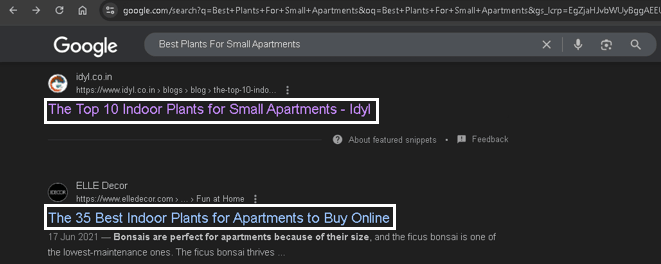 Heading 1:
Heading 1:
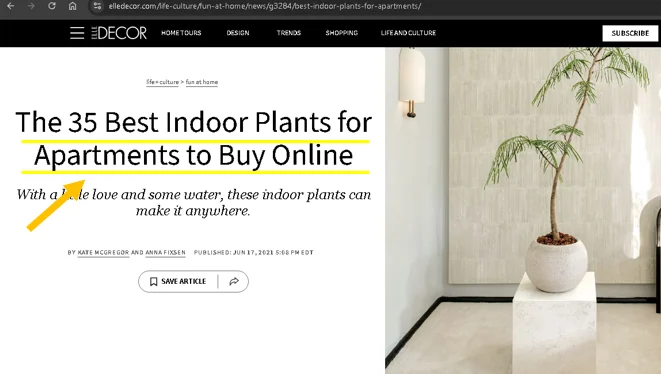
 Heading 2:
Heading 2:
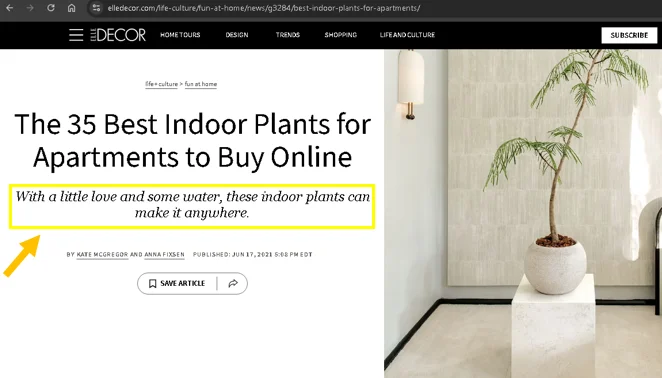

For finding Header 1 (h1) and Header 2 (h2) on any website use ctrl+U or or (Cmd + Option + U for Mac) to open page source then find h1 and h2 using Ctrl+F. Google mostly refers to Heading 1 and Heading 2 of a website.
The Top search result for "Best Plants For Small Apartments".
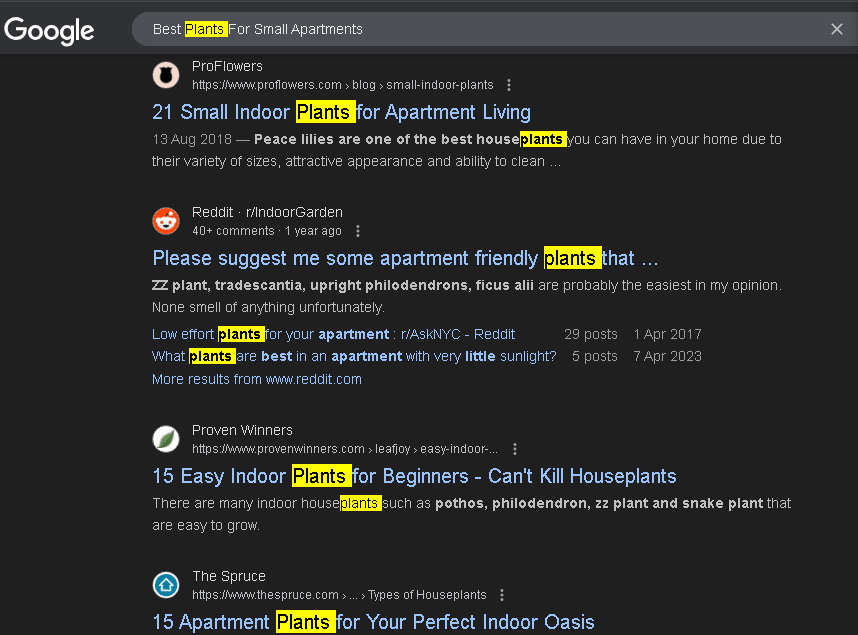
The websites appeared have relevant keywords & are indexed and ranked by google.
There are three core pillars of SEO:
1. On-Page SEO: Making Your Website Search Engine Friendly!
This is all about the things on your actual website that you can control. On page SEO focuses on optimising individual pages to improve your website's user experience and visibility.
Key concepts of on-page SEO:
- Content: This means having high-quality, helpful, and relevant information on your website. For example, if you're selling cupcakes, have a good description, beautiful photos, and even a blog is helpful.
- Titles and Descriptions: Every page on your website has a title and a description. Making them interesting and including your meta keywords and description is a good practice for attracting users.
- Website Speed: Make sure your website loads quickly. For example, using smaller, optimized image & files instead of huge, high-resolution ones.

*Meta descriptions are HTML attributes that provide concise summaries of a webpage's content.

*Search engines use these keywords to understand the page's topic and help it rank in search results. You can find them in a website's Page Source by pressing Ctrl+U.
Website performance can be measured by a site called PageSpeed Insights. Here we can see that performance score is 76 and SEO score is 100 which is a good score.
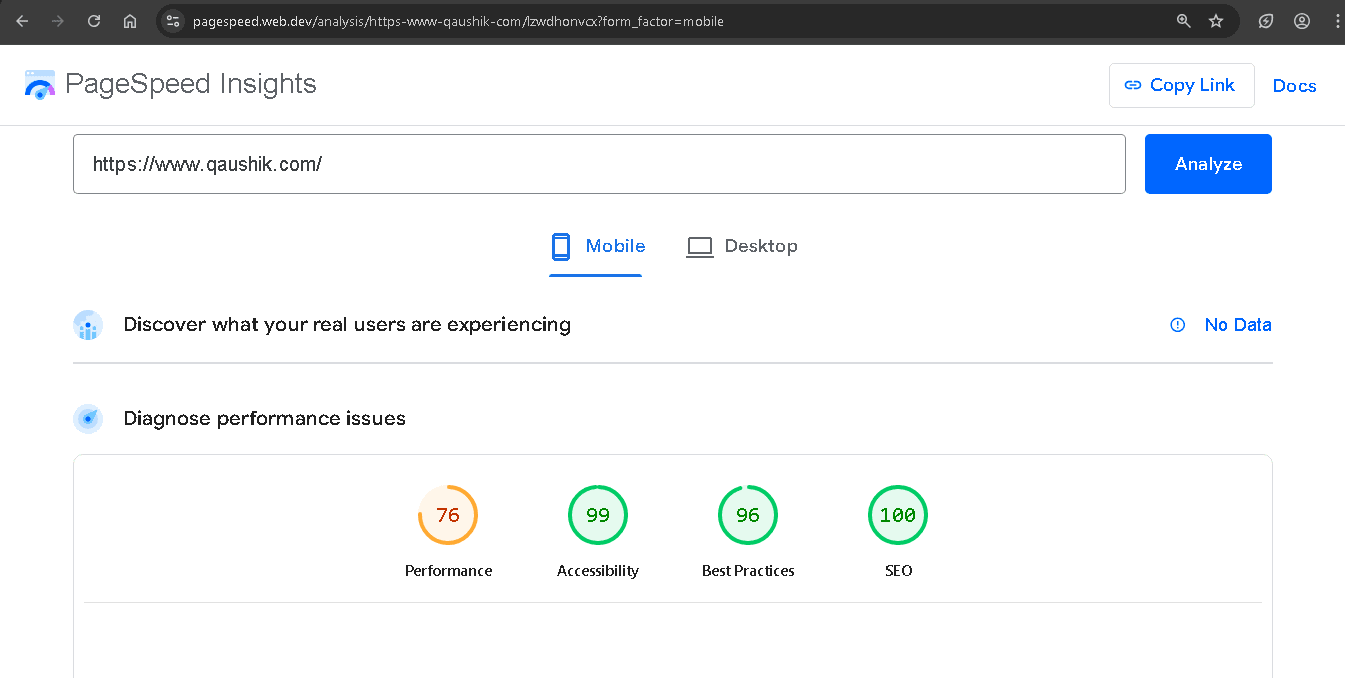 https://pagespeed.web.dev/
https://pagespeed.web.dev/
*Optimised Image: Image optimization means delivering high-quality images in the optimal format, dimension, and resolution while keeping the smallest possible file size that will not result in noticeable image degradation.

. webp is a modern image format that offers superior compression and quality compared to older formats like JPEG and PNG, making it suitable for use on the web.
How it's done: This is done by compressing the image, resizing it, and choosing the right file format (.webp). The goal is to improve website loading speed, enhance user experience, and potentially boost SEO rankings.
2. Off-Page SEO: Building Your Website's Reputation
This is about what happens outside your website that tells search engines you're trustworthy and popular.
Key concepts of off-page SEO:
- Backlinks: When another reputable website links to your website, it's like a vote of confidence. The more high-quality backlinks you have, the more Google trusts your site. For example, If a popular website links to your blog, it boosts your credibility and ranking.
- Social Media: Social media can drive traffic to your site. Plus, it helps people discover your brand. For example, sharing your latest creation on Instagram with a link back to your website.
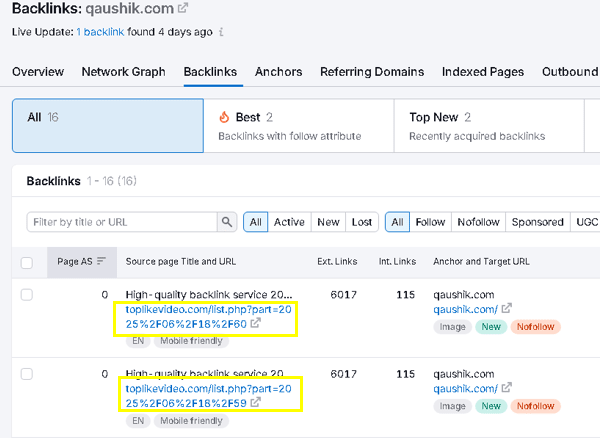 https://www.semrush.com/projects/
https://www.semrush.com/projects/
3. Technical SEO: Behind-the-scenes setup
Technical SEO ensures search engines can efficiently find and index your site.
Key concepts of Technical SEO:
- Sitemap: Think of this as a map of your website that you give to Google. It helps them understand all the pages on your site.
- Security: Ensure your site uses HTTPS to protect user data and trust
- For Example: If your site loads slowly on mobile or is hard to navigate, Google might push it down the results—even if your content is good.

A screenshot of Sitemap of Qaushik.com lists Page URLs:
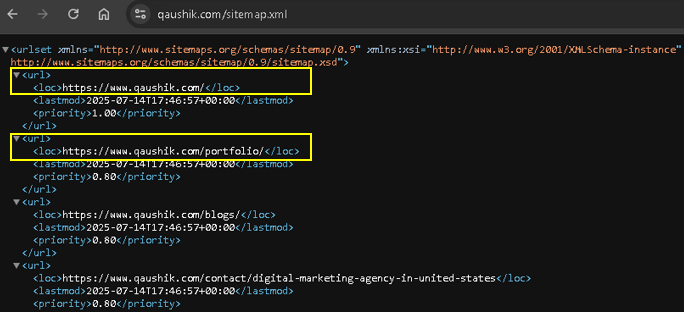
- Helps People Find You
- Drives Free, Organic Traffic
- Cost-Effective Marketing
- Helps You Understand Your Audience
- Builds Credibility & Trust
Now you have understood what SEO is and how it works. Now let's see how to do it.
- Think Keywords: Brainstorm what people would search for to find your business/content.
- Create Amazing Content: Write helpful, engaging, and unique content for your website such as blogs or videos.
- Optimize Your Pages: Make sure your page titles, descriptions, and images include keywords and are optimized.
- Make it Mobile-Friendly: Ensure your website looks great on phones as over 60% of searches happen there.
- Build links from relevant websites to improve rankings.
SEO might sound technical, but at its heart, it's all about making your content easy to find and enjoyable to read. Whether you're writing your first blog or building a growing online presence, the steps you take today can make all the difference tomorrow. With a few thoughtful tweaks, even beginners can start climbing the search rankings and attracting more readers.
Every keyword placed with care, every useful link you include, and every blog post shared brings you one step closer to being seen, heard, and appreciated online. And the best part? SEO rewards consistency and creativity — not perfection.
By understanding these fundamental principles, even beginners can effectively improve their search rankings and attract more readers in St. Petersburg and beyond.
Remember, you don't need to be an expert. You just need to start smart.
SEO stands for Search Engine Optimization. It's the process of making your website more visible on search engines like Google. It's important because most users only look at the first page of search results, so SEO helps people find your content when they search for related topics.
Google uses a 4-step process: Crawling (bots visit your site), Indexing (adding pages to Google's library), Ranking (deciding where to place your page based on quality, speed, keywords), and Keywords (matching search terms with relevant content).
The three pillars are: 1) On-Page SEO (optimizing content, titles, descriptions, and website speed), 2) Off-Page SEO (building backlinks and social media presence), and 3) Technical SEO (sitemaps, security, and behind-the-scenes setup).
Start by thinking about keywords your audience would search for, create helpful and engaging content, optimize your page titles and descriptions, make your website mobile-friendly, and build links from relevant websites. You don't need to be an expert to begin.
Keywords are words or phrases users enter into search engines. Use them naturally in your page titles, URLs, and headings. For example, if writing about "Best Plants for Small Apartments," use keywords like "plants for small spaces" and "indoor plants for apartments." Avoid overusing keywords as it's considered spam.